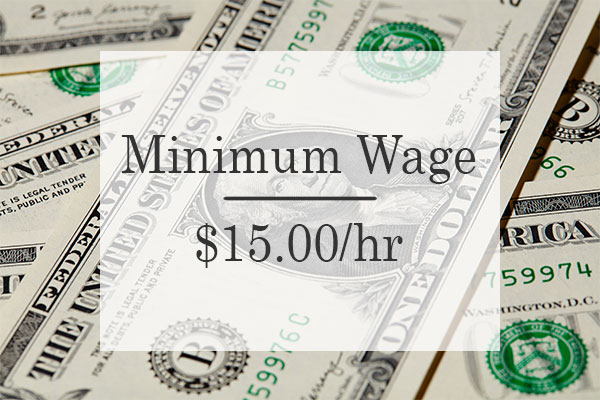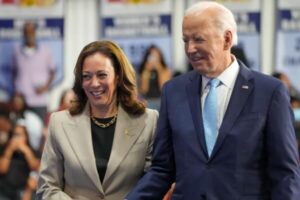$15 Minimum Wage Increase: Will It Happen?
Minimum wage workers could see their pay more than double over the next four years if a proposal from President Joe Biden successfully steers its way through Congress.
Biden wants the minimum wage – currently set at $7.25 an hour – to jump to $15 an hour by 2025. The increases would be phased in at approximately $1.75 an hour for each of the next four years.
The new standard would mean pay raises for 17 million workers directly affected and lift 900,000 Americans above the poverty threshold, according to a study by the nonpartisan Congressional Budget Office (CBO).
The CBO study also warned that changing the minimum wage for the first time since 2009 would eliminate 1.4 million jobs, mostly among young, less-educated people in the service and entry-level industries.
“No one should work 40 hours a week and live below the poverty wage,” Biden said. “And if you’re making less than $15 an hour, you’re living below the poverty wage.”
The President is following up on promises he made in the 2020 campaign to increase the minimum wage to $15. The federal minimum wage hasn’t changed since 2009. It has been a hot-button issue for the Democratic Party, which got the first Wages Act through the House of Representatives in 2018, but never got a hearing in the Republican controlled Senate.
Republicans are concerned about the cost to small businesses, particularly those in the service industry. The CBO study had this sobering assessment over what will happen to prices and employment if the minimum wage is raised:
“Higher wages would increase the cost to employers of producing goods and services. Employers would pass some of those increased costs on to consumers in the form of higher prices, and those higher prices, in turn, would lead consumers to purchase fewer goods and services. Employers would consequently produce fewer goods and services, and as a result, they would tend to reduce their employment of workers at all wage levels.”
Will There be a $15 Federal Minimum Wage?
The prospects of a $15 federal minimum wage being passed in the short term – i.e. being part of the $1.9 trillion American Rescue Plan now working its way through Congress – are not good.
The prospects of some form of this bill getting through Congress in the long term – i.e. as a stand-alone bill to be debated after the stimulus package bill is voted on – are better, but not a slam dunk.
Here’s why.
Rolling the $15 an hour proposal into the $1.9 trillion stimulus bill drew heavy opposition from Republicans, who among other things, said it violates procedural rules in the U.S. Senate for budget reconciliation.
Biden didn’t dispute that in an interview with CBS News on Feb. 5. “I put it in, but I don’t think it’s going to survive,” he said. “My guess is it will not be in the stimulus bill.”
Still, the fact that raising the minimum wage came from a Democratic president and needs to get through a Democrat-controlled Congress would seem to make passing some form of this proposal a strong possibility down the line.
It should be a cinch in the House of Representatives where a simple majority vote will get it through. Democrats outnumber Republicans 221-210 in the House.
However, it would need 60 votes to get through the Senate as a stand-alone bill and that means gathering Republican support that currently is not there. The Senate is split 50-50 among Democrats and Republicans. At least one Democrat, West Virginia Senator Joe Manchin, has said he’s opposed to the bill, at least for now.
When Will Congress Vote on the $15 Minimum Wage?
Though it appears to be a foregone conclusion for everyone except Vermont Senator Bernie Sanders – more on that in a moment — that raising the minimum wage won’t be part of the $1.9 trillion stimulus bill, there also doesn’t seem to be a hurry to get on this issue.
That much was confirmed when Democrats joined Republicans approving by voice vote a measure prohibiting in increase of the federal minimum wage during the global COVID-19 pandemic.
That could push the debate back months, perhaps even a year, depending on how politicians define “the end of the global pandemic.”
Sanders, however, is still trying his best to find a loophole in Senate rules that would allow the $15 an hour minimum wage to be part of $1.9 trillion stimulus package. The Vermont independent is chairman of the Senate Budget Committee, and thus in charge of making it part of any proposal.
“The CBO has demonstrated that increasing the minimum wage would have a direct and substantial impact on the federal budget,” Sanders said in a statement Monday. “What that means is that we can clearly raise the minimum wage to $15 an hour under the rules of reconciliation.”
Bernie lives in a dream world some days and that probably was one of them.
Pros & Cons of a $15 Minimum Wage
There is plenty of ammunition on both sides of the argument over a $15 an hour federal minimum wage so expect a highly-contentious debate, if and when it ever happens.
The good side is obvious: low-wage workers get a big boost. The bad side is just as obvious: businesses that employ low-wage workers, can’t afford to spend much more.
Pros of a $15 Minimum Wage
- There would be an immediate pay raise for 17 million Americans, some of whom would see their salaries double in just four years. Another 10 million workers who currently earn right on the $15 an hour line, also would see their pay go up as the standards climbed, meaning 27 million workers profited from the change.
- An increase in wages would push more than 900,000 people above the poverty line. The U.S. Census Bureau says 10.5% of the U.S. – about 34 million people – lived in poverty at the end of 2019, the latest data available.
- The minimum wage would reach $15 in 2025, but not stop there. The proposal calls for a continued increase at the same rate as median hourly wages.
- The increase in minimum wages would boost spending by lower-income families, who spend a larger portion of their income on goods and services.
- Raising the minimum wage would cause an increase in revenues for the federal government, mostly from labor income.
Cons of a $15 Minimum Wage
- The CBO estimates that 1.4 million jobs would be eliminated.
- There would be an estimated $54 billion impact on the federal deficit over the next 10 years, which is really insignificant given the $3.7 trillion deficit absorbed in 2020 alone.
- There would be an increase cost to employers for producing goods and services.
- Most of the job losses would be at entry-level positions and in the service industry, meaning young people would be hit the hardest.
- Spending on Medicaid, Medicare and Unemployment Insurance would go up, mostly to cover spending on insurance and payments to health care providers.
- Cost for Social Security also would rise because an increase in average benefits.
States with a $15 Minimum Wage
More than half the states in the U.S. already have minimum wage laws that exceed the current federal requirement of $7.25 an hour, but only a handful have actually approved measures that eventually push the limit to $15 an hour.
Florida was the most recent addition to a list of states approving raising the minimum wage to $15. No surprisingly, the list contains mostly Democratic, liberal-leaning states and includes:
- California
- Connecticut
- Illinois
- Maryland
- Massachusetts
- New Jersey
- New York
- Virginia
- Florida
- Washington, D.C.
There were 20 states that raised the minimum wage on Jan. 1, 2021, but those that have approved $15 an hour are getting there in phases. None has reached $15 yet. Those states that raised the minimum on Jan. 1 range from 8 cents an hour in Minnesota ($10.08 per hour) to $1.50 an hour in New Mexico ($10.50).
Virginia will raise its minimum wage from $7.25 to $9.50, starting May 1. California has the highest minimum wage at $14 an hour.
Sources:
- N.A. (2021, February 8) The Budgetary Effects of the Raise the Wage Act of 2021. Retrieved from https://www.cbo.gov/publication/56975
- N.A. (2020, September 15) Income and Poverty in the United States: 2019. Retrieved from https://www.census.gov/library/publications/2020/demo/p60-270.html
- N.A. (ND) State Minimum Wages. Retrieved from https://www.ncsl.org/research/labor-and-employment/state-minimum-wage-chart.aspx


















